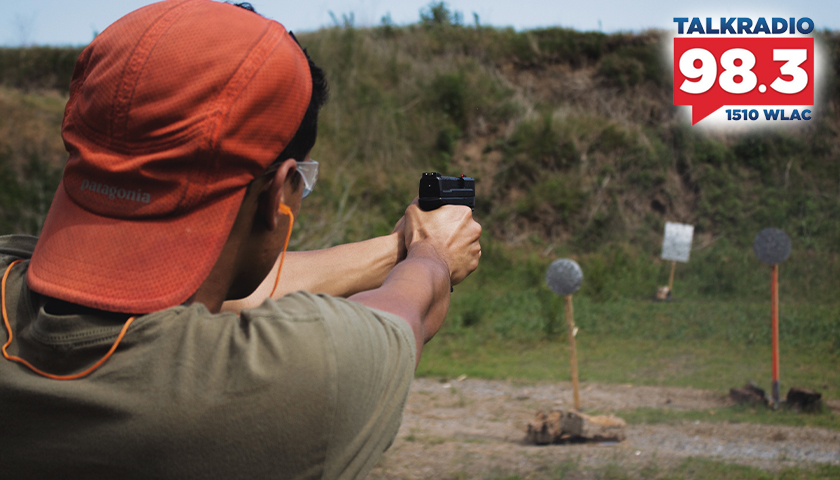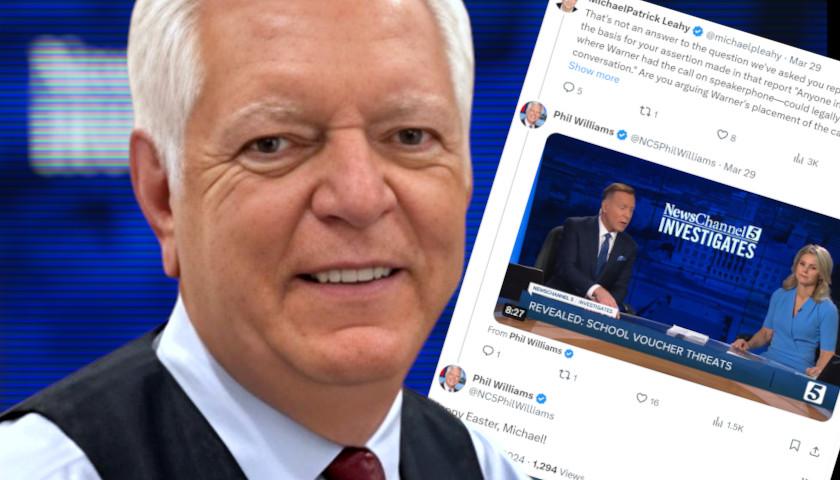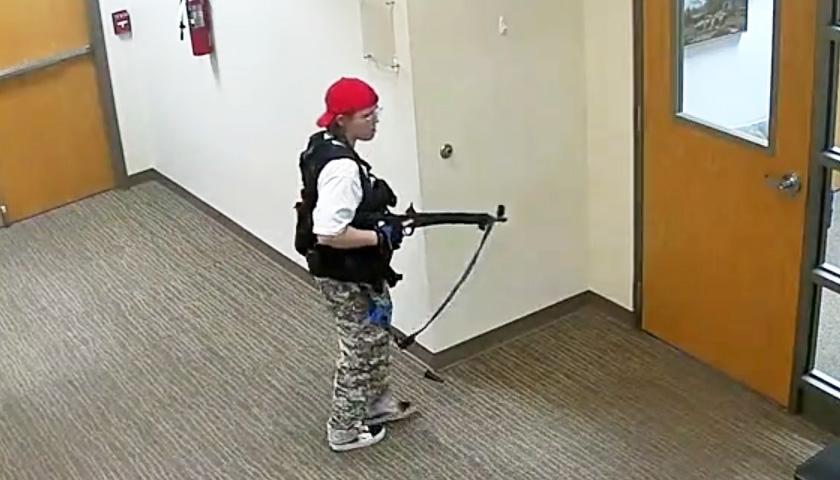Live from Music Row Tuesday morning on The Tennessee Star Report with Michael Patrick Leahy – broadcast on Nashville’s Talk Radio 98.3 and 1510 WLAC weekdays from 5:00 a.m. to 8:00 a.m. – host Leahy welcomed John Harris, Founder of the Tennessee Firearms Association in studio to give a brief history of Tennessee’s Second Amendment laws and the classic rural Democrat mindset.
Leahy: In studio our very good friend, the founder and executive director of the Tennessee Firearms Association, John Harris.
John will get to the details of your event in a moment. But we got a little sidetracked because I’m a history buff and in awe of your knowledge of Tennessee law and of your knowledge of the Second Amendment.
You were explaining to me how it came to be that in 1870, thereabouts a law was passed in Tennessee that still is on the books. The premise is that it’s legal to own a firearm.
Harris: Oh, absolutely. Well, to carry. So what happened after the 1840 Constitution, then we went through an era that culminated in the Civil War.
And in 1870, as you indicated, prior to the break, the state of Tennessee adopted its third Constitution. 1870 version. And in it, they stripped out the overt racial language.
Leahy: I noticed that emphasis, the overt racial language.
Harris: Oh, yeah. There’s no doubt.
Leahy: Because Tennessee in the south and then 1870, 1880, and the 1890s, all the Democrats put for those Jim Crow laws.
Harris: It was overwhelming in Tennessee. And the 1870 version provided the citizens had the right to keep and bear arms. But the legislature could regulate the wearing of arms with a view towards crime prevention.
And when they put that language in then following that you saw a series of laws over the next century that prohibited people from carrying guns in public at all, although the crime was relatively minor.
Leahy: So you could own a gun.
Harris: Yes.
Leahy: But you couldn’t carry it.
Harris: You could only carry it. This was peculiar, but it told you that they understood the Second Amendment better than the legislature we’ve got today. (Leahy chuckles) You could only carry a gun in public if it was a military-style handgun, and you carried it openly in your hand. And when I started practicing law in ’86.
Leahy: You mean you had to be walking around with a gun in your hand?
Harris: Yes.
Leahy: That was legal.
Harris: That was legal.
Leahy: Wow.
Harris: But it had to be a military-grade handgun. But that was an acknowledgment that the Second Amendment exists predominantly to protect weapons suitable for military use, which the Tennessee Supreme Court has held twice in published opinions, as opposed to what we think of as self-defense or everyday carry guns.
But the law, when I started practicing in ’86 was as long as you were carrying it in your hand, that wasn’t a crime. But if you holstered it, if you concealed it, if it wasn’t a military great handgun, those were all crimes.
Leahy: In 1994 came the need for the Tennessee Firearms Association.
Harris: Yes.
Leahy: Explain that.
Harris: Well, in ’94, a representative out of Chattanooga, Harold Stockburger, Republican past Tennessee’s first issue permit system, which took us a big step forward because it gave us the ability to go beyond getting a sheriff’s commission.
Which was the main way most people carry a gun prior to ’94. You’d go to your local sheriff, you’d get a Deputies Commission. You weren’t really a deputy, but it legally let you carry in that county. But there was no statewide process.
Leahy: Interesting.
Harris: So the 94 law let there be a statewide process that ostensibly, most people had access to. But what they didn’t do is there was a century of laws that are largely Jim Crow-type laws. You can’t carry here there and everywhere else.
So we had a permitting system. But you couldn’t carry it anywhere except for most streets and sidewalks. You couldn’t go to parks, public buildings on school grounds, or in restaurants. You had a lot of prohibited locations.
And so from 1994, what TFA worked on is trying to get rid of this century-old baggage that restricted the ability of citizens to carry guns, just like we can carry pocket knives pretty much anywhere we want to go.
Leahy: So 25 years in…
Harris: Yes.
Leahy: (Chuckles) How’s Tennessee done?
Harris: I’ll make this observation we made as a practical matter, and in some respects, more progress when we had a Democrat-controlled General Assembly than we have made in the last twelve years with a Republican-controlled General Assembly.
Leahy: People are going to say, why is that John Harris?
Harris: The reason was the Republicans, when they were in the minority, were hungry for conservative credit. They wanted the majority, but they had to seduce the conservative side of the Republican Party to support them.
And then you had rural Democrats, something that we still have some of, but not a lot. And when you put the conservative Republicans together with the rural conservative Democrats, people like Eddie Bass, John Mark Windle, and even Ben West…
Leahy: And let me just stop for a moment and say John Mark Windle. There is a man of principle on the Democratic side who I think he’s the only sane Democrat elected official in the entire United States from what I know.
Harris: Certainly in Tennessee. But I’ll largely agree with you.
Leahy: John Mark, we have to have you in here.
Harris: He was actually the only elected Democrat at our event on Saturday.
Leahy: Oh he was there on Saturday?
Harris: He was there. Yeah. And I can’t say enough good things about him. He is more conservative than probably a third of the elected conservatives in the General Assembly.
Leahy: And it’s interesting about John Mark. He still remains a Democrat.
Harris: Yes.
Leahy: He’s never gonna change, is he?
Harris: No, I don’t think so.
Leahy: He’s always gonna be a Democrat, but he’s the only Democrat in the current delegation, I guess there’s 25 now. How many?
Harris: I think that’s right.
Leahy: All the other 24 are crazy.
Harris: Oh, they are.
Leahy: They’re, like, totally crazy.
Harris: All the rest are pretty much pure Pelosi-Schumer Democrats. And John Mark is the is what I saw back in ’94 when I started, there were quite a number of conservative rural Democrats, and they’ve just been running out of the party.
Leahy: Have they been running out of the party and has the economic base that they represented disappeared? The rural Democrats that you knew 25 years ago, where they were like farmers.
Harris: They were farmers. They were agrarian-based. A lot of them. I tell you, in my opinion, traveling the state, doing a lot of public speaking. There’s a lot of those guys, John Mark type Democrats up in West Tennessee, Northwest Tennessee,
Leahy: Northwest Tennessee. Dyer County and places like that.
Harris: And they will typically hold their nose and vote Republican even though they’ve been Democrat for 50 generations. (Chuckles)
Leahy: It’s very hard for them to vote for a Republican. It is because their view is the classic view that the Republican was a party of big business and bad guys. So there’s a lot of that.
Harris: That was a view. And that’s a perception that some in the Republican Party still try very hard to earn. (Laughter)
Leahy: That’s a nice way to put it.
Harris: If you look at their donor list, you know exactly who they are.
Leahy: You were able to make more progress when the Tennessee House of Representatives, which has 99 members, was Democrat-controlled.
A big number of those Democrats were rural Democrats who were basically common sense Americans like John Mark Windle.
Harris: Absolutely. We relied upon a group of that type of Democrat. Windle Democrats and the conservative Republicans. And those two put together got us past that vote margin we had to have to pass off, even if the speaker didn’t want it.
Leahy: Jimmy Naifeh?
Harris: And Jimmy Naifeh wasn’t necessarily opposed to the Second Amendment issue. It wasn’t really his issue. He didn’t really care that much.
Leahy: He was about holding on to his power.
Harris: He wanted to hold power.
Leahy: A classic old-style Democratic power, holding on to.
Harris: He was.
Leahy: But he was pragmatic in a way where the Democrats today, they’re just lunatic ideologues from what I can tell.
Harris: Oh they are. Even Jimmy Nafeigh was a rural Democrat.
Leahy: Yeah, he was. He was. And before him Ned McWhorter.
Harris: He was in shock the day on the floor that he learned that he couldn’t have a shotgun in the cab of his pickup truck without a permit. Nafeigh said that on the floor. (Leahy laughs)
Leahy: We’ll have more with John Harris, and we’re learning the history of the Second Amendment in Tennessee. It’s fascinating.
Listen to the second hour here:
– – –
Tune in weekdays from 5:00 – 8:00 a.m. to the Tennessee Star Report with Michael Patrick Leahy on Talk Radio 98.3 FM WLAC 1510. Listen online at iHeart Radio.








